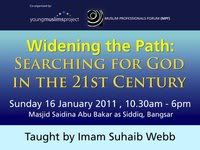
The world today still suffers from racism, which continues to exist on different human levels. Let us now see what Islam has to say on this issue and how it solved it for good.
Islam is a religion of unity; it unifies its followers under one nation, one banner; that is why all Muslims are considered as brothers and sisters. Islam does not make any distinction between an Arab and non-Arab, black person and a white; the only difference between people is due to their level of taqwa (consciousness of Almighty Allah) and good conduct
The Glorious Qur’an has abolished racism in a clear-cut categorical manner and clearly states that all people are alike in origin, nature, reason for existence, and morality:
'O mankind! We have created you from a single male and female and made you into nations and tribes so that you may know each other. The most honorable of you in the sight of Allah are surety the righteous." (Al-Hujurat: 13)
The Qur’an asserts that differences in race, color, and language exist and must be a vehicle for friendship and harmony. In doing so, all will cooperate to establish God's message on earth, build civilizations, and utilize the world's resources for the betterment of humanity.
"O mankind! Be careful of your duty to your Lord Who created you from a single soul and from it created its mate and from them twain hath spread abroad a multitude of men and women.” (An-Nisa’: 1)
According to these Qur'anic verses, Islam stressed the absolute unity in variety of the human race. In his famous Farewell Pilgrimage sermon, the Prophet (peace and blessings be upon him) declared: "'O people, our father is one, and our God is One; We are all from Adam, and Adam is from dust. No Arab is to be preferred over a non-Arab except by virtue of his piety."
In another hadith, he (peace and blessings be upon him) said: "Allah does not look at your images or your colors but He looks at your hearts (intentions) and your deeds. Creatures are the dependants of Allah and the closest among them to Allah are indeed the most useful to His dependants."
In practice, Prophet Muhammad (peace and blessings be upon him) had among his closest Companions Salman the Persian, Suhaib the Roman, and Bilal the Ethiopian. Two of the three Companions were ex-slaves who were liberated after embracing Islam, namely Salman and Bilal. Despite this, and in spite of the black complexion of Bilal, he was chosen by the Prophet (peace and blessings be upon him) as the first muezzin to prayer, a position coveted by many. As a matter of fact, senior Companions like Abu Bakr and `Umar used to call Bilal 'our master', and the Prophet himself used to say: 'Salman is a member of our family.'
It was not, however, an easy task to cancel racism in Islam. But every time it rose its head the Prophet (peace and blessings be upon him) used to give the Muslims an important lesson. Thus when his Arab Companion Abu Dharr called Bilal 'son of the black woman', the Prophet (peace and blessings be upon him) got angry and told him: 'You are a man who has ignorance in him.' Abu Dharr felt such a great remorse that he put his cheek on the ground and asked Bilal to tread on his other cheek if he’d like to.
The Prophet (peace and blessings be upon him) taught that religions have the same origin, the whole earth belongs to us all, and we must work together to establish peace and justice for all. The Prophet (peace and blessings be upon him) stated, 'The earth has been made a place of worship for me, and a pure place.' The whole earth must be protected and respected, and everything and everyone on it.
Therefore, making discrimination and distinction among people on account of their color, race, etc. has no basis in Islam. It leads to the disintegration and disunity of the Ummah. It also contradicts the command of Allah the Almighty to Muslims in the Qur’an: “And hold fast by the covenant of Allah all together and be not disunited.” (Al `Imran: 103)
Positive Means to Overcome Racism:
We must increase awareness in schools and media outlets regarding the evils of racism, which is akin to a disease that destroys unity, disrupts civilizations, and leads to conflicts and war.
Winning Allah’s pleasure is not due to color, race or language; but rather to the degree that man tries to help others. This is the fundamental religious value that establishes brotherhood in humanity, and it should be promoted in the workplace at all levels.
We must be honest in stating that racism played a great role in encouraging conflict and war (such as the American Civil war, Turkish-Kurdish conflict, the Serb-Croat conflict, and the Tamil-Sri Lankan).
We must sponsor studies of previous civilizations, to show the role of racism in their decline and fall.
We must reform the field of sociology and anthropology, which have a history in spreading racism. A new vision to the oneness of humanity and a shared fate need to be promoted in these fields.
The Affirmation of Basic Religious Values:
As Muslims, we do affirm the worth of every person, emphasize the need for compassion, join in the call to reconciliation, and assert the desirability of cooperation. Differences between us should be the reason we come together, rather than the reason we drift apart.
So based on this, if anyone happens to be a victim of racism, this shouldn't drive him to have mistrust of the well-established rule due to an individual case. It should be well-ingrained in his mind that, according to what is mentioned above, Islam is totally against giving privilege to someone or some people due to color or race.
By this, if one notices contravention of the above-mentioned rule in any place, it doesn’t mean that the same is expected to take place elsewhere. This also should not be taken as a pretext to nullify the whole system, the Divine Legislation, which stipulates that all human beings are equal before the law, and in the Sight of Allah, save the privilege one enjoys for being pious and righteous in the true sense."
(taken from www.islamonline.net with modification)
Back to Index







No comments:
Post a Comment